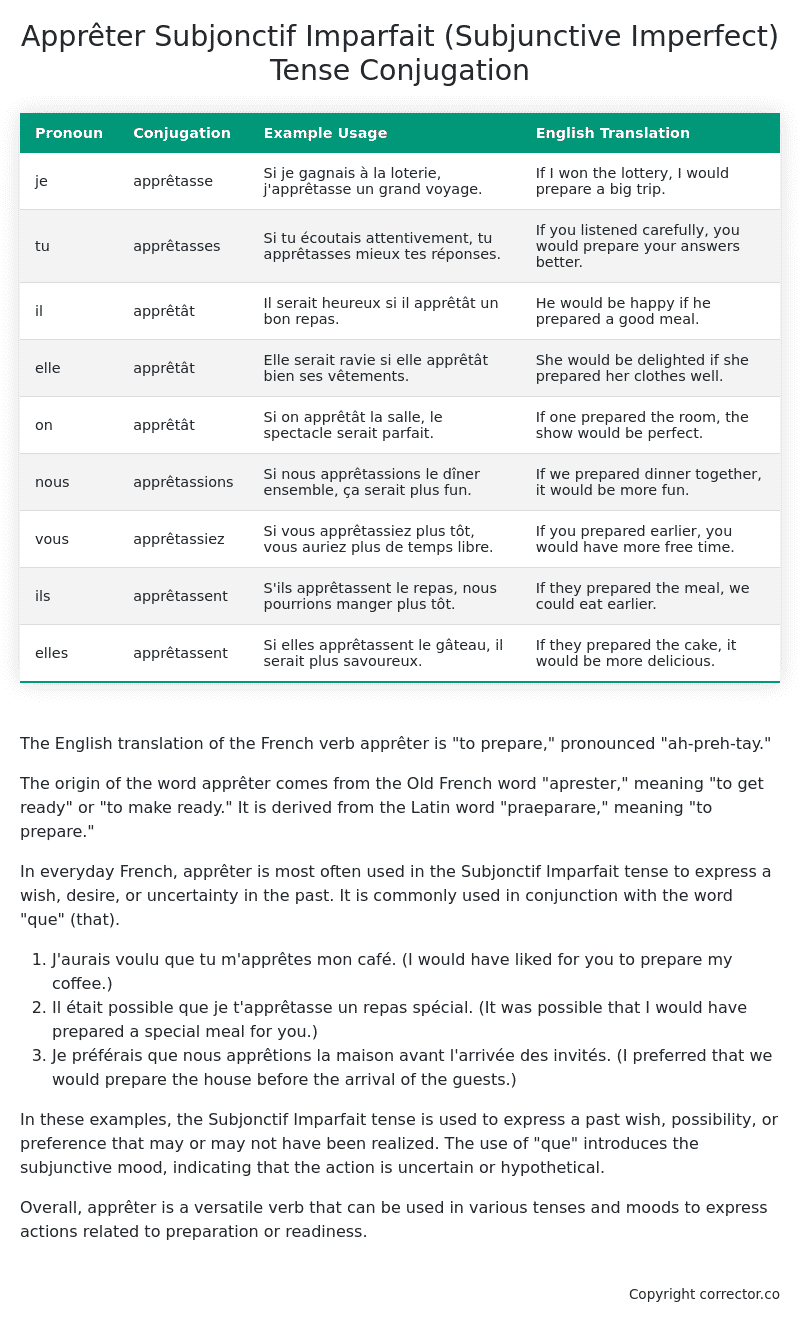Subjonctif Imparfait (Subjunctive Imperfect) Tense Conjugation of the French Verb apprêter
Introduction to the verb apprêter
The English translation of the French verb apprêter is “to prepare,” pronounced “ah-preh-tay.”
The origin of the word apprêter comes from the Old French word “aprester,” meaning “to get ready” or “to make ready.” It is derived from the Latin word “praeparare,” meaning “to prepare.”
In everyday French, apprêter is most often used in the Subjonctif Imparfait tense to express a wish, desire, or uncertainty in the past. It is commonly used in conjunction with the word “que” (that).
- J’aurais voulu que tu m’apprêtes mon café. (I would have liked for you to prepare my coffee.)
- Il était possible que je t’apprêtasse un repas spécial. (It was possible that I would have prepared a special meal for you.)
- Je préférais que nous apprêtions la maison avant l’arrivée des invités. (I preferred that we would prepare the house before the arrival of the guests.)
In these examples, the Subjonctif Imparfait tense is used to express a past wish, possibility, or preference that may or may not have been realized. The use of “que” introduces the subjunctive mood, indicating that the action is uncertain or hypothetical.
Overall, apprêter is a versatile verb that can be used in various tenses and moods to express actions related to preparation or readiness.
Table of the Subjonctif Imparfait (Subjunctive Imperfect) Tense Conjugation of apprêter
| Pronoun | Conjugation | Example Usage | English Translation |
|---|---|---|---|
| je | apprêtasse | Si je gagnais à la loterie, j’apprêtasse un grand voyage. | If I won the lottery, I would prepare a big trip. |
| tu | apprêtasses | Si tu écoutais attentivement, tu apprêtasses mieux tes réponses. | If you listened carefully, you would prepare your answers better. |
| il | apprêtât | Il serait heureux si il apprêtât un bon repas. | He would be happy if he prepared a good meal. |
| elle | apprêtât | Elle serait ravie si elle apprêtât bien ses vêtements. | She would be delighted if she prepared her clothes well. |
| on | apprêtât | Si on apprêtât la salle, le spectacle serait parfait. | If one prepared the room, the show would be perfect. |
| nous | apprêtassions | Si nous apprêtassions le dîner ensemble, ça serait plus fun. | If we prepared dinner together, it would be more fun. |
| vous | apprêtassiez | Si vous apprêtassiez plus tôt, vous auriez plus de temps libre. | If you prepared earlier, you would have more free time. |
| ils | apprêtassent | S’ils apprêtassent le repas, nous pourrions manger plus tôt. | If they prepared the meal, we could eat earlier. |
| elles | apprêtassent | Si elles apprêtassent le gâteau, il serait plus savoureux. | If they prepared the cake, it would be more delicious. |
Other Conjugations for Apprêter.
Le Present (Present Tense) Conjugation of the French Verb apprêter
Imparfait (Imperfect) Tense Conjugation of the French Verb apprêter
Passé Simple (Simple Past) Tense Conjugation of the French Verb apprêter
Passé Composé (Present Perfect) Tense Conjugation of the French Verb apprêter
Futur Simple (Simple Future) Tense Conjugation of the French Verb apprêter
Futur Proche (Near Future) Tense Conjugation of the French Verb apprêter
Plus-que-parfait (Pluperfect) Tense Conjugation of the French Verb apprêter
Passé Antérieur (Past Anterior) Tense Conjugation of the French Verb apprêter
Futur Antérieur (Future Anterior) Tense Conjugation of the French Verb apprêter
Subjonctif Présent (Subjunctive Present) Tense Conjugation of the French Verb apprêter
Subjonctif Passé (Subjunctive Past) Tense Conjugation of the French Verb apprêter
Subjonctif Imparfait (Subjunctive Imperfect) Tense Conjugation of the French Verb apprêter (this article)
Subjonctif Plus-que-parfait (Subjunctive Pluperfect) Tense Conjugation of the French Verb apprêter
Conditionnel Présent (Conditional Present) Tense Conjugation of the French Verb apprêter
Conditionnel Passé (Conditional Past) Tense Conjugation of the French Verb apprêter
L’impératif Présent (Imperative Present) Tense Conjugation of the French Verb apprêter
L’infinitif Présent (Infinitive Present) Tense Conjugation of the French Verb apprêter
Struggling with French verbs or the language in general? Why not use our free French Grammar Checker – no registration required!
Get a FREE Download Study Sheet of this Conjugation 🔥
Simply right click the image below, click “save image” and get your free reference for the apprêter Subjonctif Imparfait tense conjugation!

Apprêter – About the French Subjonctif Imparfait (Subjunctive Imperfect) Tense
Formation
Common Everyday Usage Patterns
Interactions with Other Tenses
Subjonctif Présent
Indicatif Passé Composé
Conditional
Conditional Perfect
Summary
I hope you enjoyed this article on the verb apprêter. Still in a learning mood? Check out another TOTALLY random French verb conjugation!


